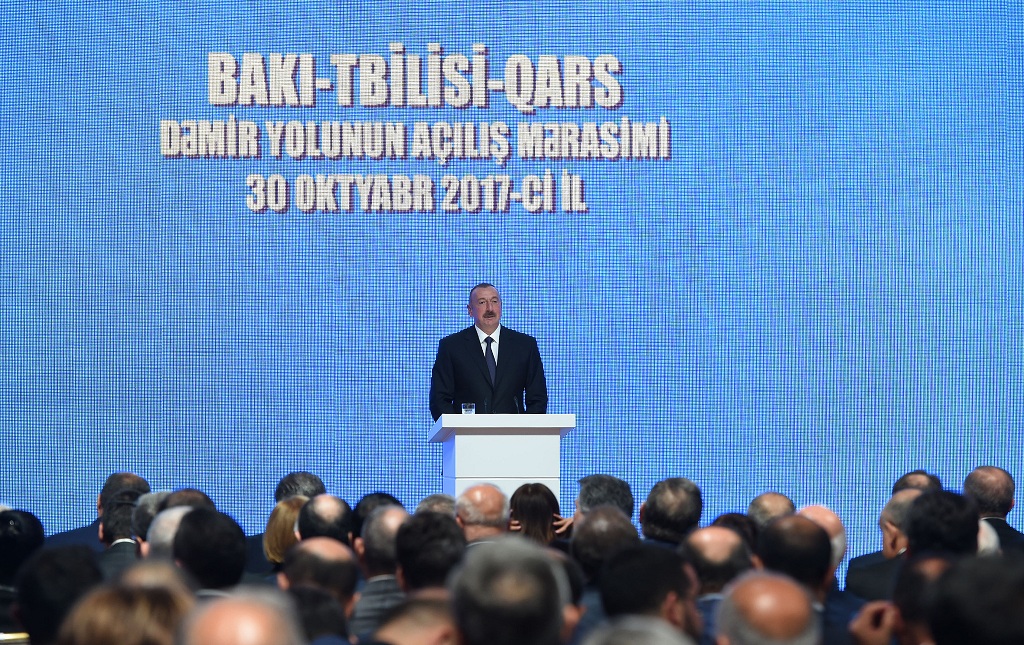The Baku-Tbilisi-Kars (BTK) railway, which will help move goods from the Far East to Europe and pass through the Caspian region, was opened on Monday.
“The Baku-Tbilisi-Kars railway, a new development project for Eurasia, is the restoration of the ancient Silk Road on steel highways,” Azerbaijan’s President Ilham Aliyev said in a speech given at the Baku International Sea Trade Port along the Caspian Sea promenade, to mark the departure of the first trains.
The railway running from Baku through the Georgian capital, Tbilisi, to Kars in eastern Turkey is “the shortest and most reliable link between Europe and Asia,” Aliyev said.
The entire route measures 846 km (526 miles), with the majority of it passing through Azerbaijan before extending north into Georgia.
The BTK railway is more than just a transportation link within the South Caucasus region. The 94-year old Kars-Gyumri-Tbilisi (KGT) railway, which had been the only direct rail link between Turkey and the South Caucasus, was closed in 1993, in the midst of war between Armenia and Azerbaijan, two newly independent, former Soviet republics, over Azerbaijan’s Nagorno-Karabakh region. As a result of a war that ended in a ceasefire in 1994, over 30,000 Azerbaijanis had been killed and over one million displaced. Armenia continues to occupy Azerbaijan’s Nagorno-Karabakh region along with seven surrounding districts it captured during the war.
The newly opened BTK railway is expected to shrink transit time for the shipment of goods coming from Far East, such as China, to Europe by almost half. Currently moving goods from east to west takes between 25-30 days. The BTK line will help bring it down to 15.
The initial capacity of the railway is estimated at between three and five million tons of cargo during its first three years of operation, while by the fifth year experts expect it to reach between six and eight million tons, as well as move three million passengers. Eventually, the three countries involved hope to see 17 million tons of cargo pass along the BTK’s rails.
The route is also expected to provide new market opportunities in Europe for the Central Asian quintet – Kazakhstan, Turkmenistan, Uzbekistan, Kyrgyzstan, and Tajikistan – as well as Afghanistan.
"Today, the volume of cargo coming from China to Europe exceeds 240 million tons, and if at least 10 percent of this cargo gets transported via the Middle Corridor [the BTK line], passing through our countries, we will transport 24 million tons of cargo," Turkish President Recep Tayyip Erdogan said at Monday’s ceremony.
Turkish officials expect the line to help boost the country’s economy and trade potential, making it a central hub for Eurasian commerce, as the line will connect in Kars to Turkey’s broader railway system through which cargo and passengers can continue westward onto Europe.
Georgia is mostly looking to collect from transit fees levied, as railcars pass from Azerbaijan and head westward to Turkey. For its part, Baku hopes the BTK will help diversify the Azerbaijani economy, which relies on its hydrocarbon resources to fund the public exchequer.
The BTK line is situated in a region that has regional powers and economic giants, like Russia, to the north, and Iran to the south. The line is well poised to play an integral role in China’s trade mega-project known as One Belt, One Road (OBOR), which consists of global overland and sea routes.
Geopolitical analyst and Research Fellow at the Center for Strategic Studies under the President of the Republic of Azerbaijan Mahir Humbatov, who has authored several books about the Caspian region’s transit potential and the BTK railway, believes the incorporation of the line into OBOR is advantageous to both China, and the three BTK countries.
“China has already, several times, shown its interest in the BTK project. The future participation of China in this project mainly relies on the governments of Azerbaijan, Georgia, Turkey and somehow Central Asian countries too,” Humbatov told Caspian News.
In June, the Deputy General Director at the Department of Commerce of the central Ningxia Hui Autonomous Region of China, had indicated that Beijing was interested in leveraging the Caspian region’s logistics and shipping potential, particularly that of Azerbaijan, for the purposes of OBOR.
Monday’s ceremony was also attended by the First Vice President of Azerbaijan Mehriban Aliyeva, Turkey’s President Recep Tayyip Erdogan, and Georgia’s Prime Minister Giorgi Kvirikashvili. The Prime Ministers of Kazakhstan and Uzbekistan, as well as high-level delegations from Tajikistan and Turkmenistan, were present as well.







 Russian Foreign Minister Sergei Lavrov has reasserted that Moscow has no intentions to stop the fighting in Ukraine, even if peace talks commence.
Russian Foreign Minister Sergei Lavrov has reasserted that Moscow has no intentions to stop the fighting in Ukraine, even if peace talks commence.
 Iran has refuted reports of alleged damage to Shimon Peres Negev Nuclear Research Centre located southeast of Dimona, Israel, during the recent air...
Iran has refuted reports of alleged damage to Shimon Peres Negev Nuclear Research Centre located southeast of Dimona, Israel, during the recent air...
 Iran’s Foreign Minister, Hossein Amir-Abdollahian, has labeled a foiled Israeli drone attack in certain parts of the country as a "failure" for Isr...
Iran’s Foreign Minister, Hossein Amir-Abdollahian, has labeled a foiled Israeli drone attack in certain parts of the country as a "failure" for Isr...



